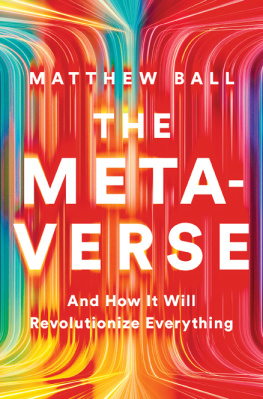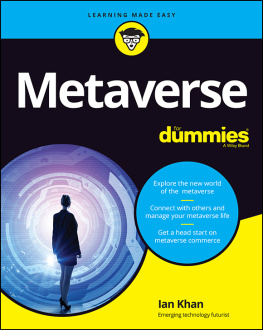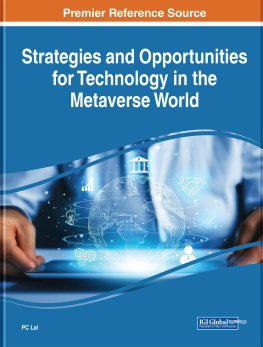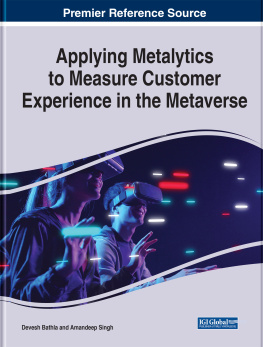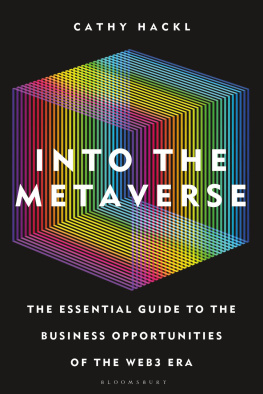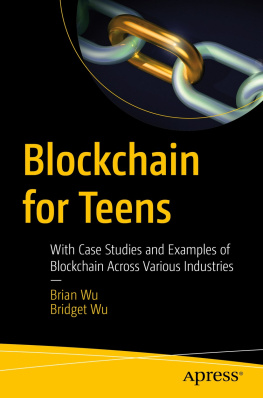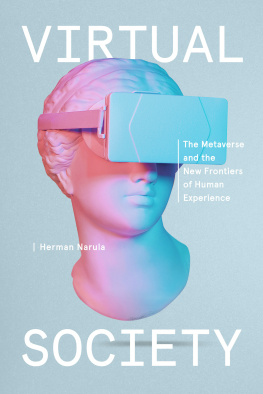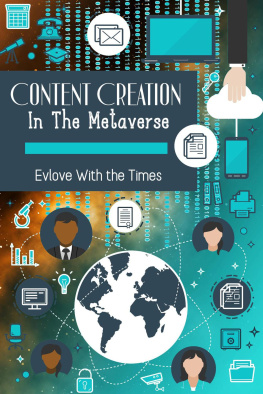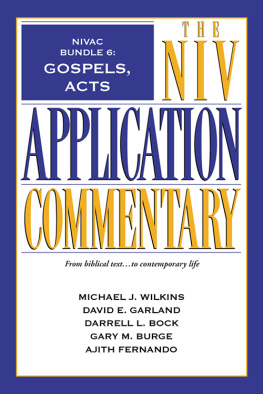Matthew Ball - The Metaverse: And How It Will Revolutionize Everything
Here you can read online Matthew Ball - The Metaverse: And How It Will Revolutionize Everything full text of the book (entire story) in english for free. Download pdf and epub, get meaning, cover and reviews about this ebook. year: 2022, publisher: Liveright, genre: Politics. Description of the work, (preface) as well as reviews are available. Best literature library LitArk.com created for fans of good reading and offers a wide selection of genres:
Romance novel
Science fiction
Adventure
Detective
Science
History
Home and family
Prose
Art
Politics
Computer
Non-fiction
Religion
Business
Children
Humor
Choose a favorite category and find really read worthwhile books. Enjoy immersion in the world of imagination, feel the emotions of the characters or learn something new for yourself, make an fascinating discovery.
- Book:The Metaverse: And How It Will Revolutionize Everything
- Author:
- Publisher:Liveright
- Genre:
- Year:2022
- Rating:3 / 5
- Favourites:Add to favourites
- Your mark:
- 60
- 1
- 2
- 3
- 4
- 5
The Metaverse: And How It Will Revolutionize Everything: summary, description and annotation
We offer to read an annotation, description, summary or preface (depends on what the author of the book "The Metaverse: And How It Will Revolutionize Everything" wrote himself). If you haven't found the necessary information about the book — write in the comments, we will try to find it.
Matthew Ball: author's other books
Who wrote The Metaverse: And How It Will Revolutionize Everything? Find out the surname, the name of the author of the book and a list of all author's works by series.
The Metaverse: And How It Will Revolutionize Everything — read online for free the complete book (whole text) full work
Below is the text of the book, divided by pages. System saving the place of the last page read, allows you to conveniently read the book "The Metaverse: And How It Will Revolutionize Everything" online for free, without having to search again every time where you left off. Put a bookmark, and you can go to the page where you finished reading at any time.
Font size:
Interval:
Bookmark:

THE
METAVERSE
And How It Will
Revolutionize Everything
MATTHEW BALL

LIVERIGHT PUBLISHING CORPORATION
A Division of W.W. Norton & Company
Independent Publishers Since 1923
To Rosie, Elise, and Hillary
TECHNOLOGY FREQUENTLY PRODUCES SURPRISES that no one predicts. But the biggest and most fantastical developments are often anticipated decades in advance. In the 1930s, Vannevar Bush, then president of the Carnegie Institution of Washington, began work on a hypothetical electromechanical device that would store all books, records, and communications, and mechanically link them together by keyword association, rather than traditional, mostly hierarchical storage models. Despite the enormity of its archive, Bush stressed that this Memex (short for memory extender) could be consulted with exceeding speed and flexibility.
In the years that followed this early research, Bush became one of the most influential engineers and science administrators in American history. From 1939 to 1941, he was vice chairman and temporarily served as chairman of the National Advisory Committee for Aeronautics, the predecessor agency to NASA. In this position, Bush convinced President Franklin D. Roosevelt to establish what became the Office of Scientific Research and Development (OSRD), a new federal agency that would be run by Bush, who would report directly to the president. The agency was provided nearly unlimited funding, primarily for secret projects that would aid the United States efforts in World War II.
Only four months after OSRD was founded, President Roosevelt approved the atomic bomb program known as the Manhattan Project, following a meeting with Bush and Vice President Henry A. Wallace. To manage the program, Roosevelt created a Top Policy Group consisting of himself, Bush, Wallace, Secretary of War Henry L. Stimson, Chief of Staff of the Army General George C. Marshall, and James B. Conant, who headed up a subbranch of OSRD previously run by Bush. In addition, the Uranium Committee (later named the S-1 Executive Committee) would report directly to Bush.
After the war ended in 1945, but two years before he left his role as director of the OSRD, Bush wrote two famous essays. The first, Science, the Endless Frontier, was addressed to the president and in it, Bush called for an increase in government investments in science and technology, rather than a peacetime reduction, as well as the establishment of the National Science Foundation. The second essay, As We May Think, appeared in The Atlantic and publicly detailed Bushs vision of the Memex.
In the years that followed his essays, Bush stepped back from public office and public view. But soon enough, his various contributions to government, science, and society began to converge. Starting in the 1960s, the US government funded a variety of projects within the Department of Defense, in partnership with a network of external researchers, universities, and other nongovernment institutions that together developed the foundation of the internet. At the same time, Bushs Memex was informing the creation and evolution of hypertext, one of the underlying concepts of the World Wide Web, which is typically written in the HyperText Markup Language (HTML) and enables users to instantly access a nearly infinite extent of online content by clicking on a given piece of text. Twenty years later, the US federal government established the Internet Engineering Task Force to guide the technical evolution of the Internet Protocol Suite, and with the help of the Department of Defense founded the World Wide Web Consortium, which, among other duties, manages the ongoing development of HTML.
While technological progress typically occurs out of common sight, science fiction often provides the general public with the clearest view of the future. In 1968, fewer than 10% of American households had a color TV, yet the second-highest-grossing film of the year, 2001: A Space Odyssey, imagined a future in which humanity had compressed these fridge-sized devices into coaster-thin displays and used them idly during breakfast. Anyone watching the film today will instantly liken these devices to iPads. Per usual, the imagined technology, like Bushs Memex, took longer to arrive than was originally anticipated. iPads appeared in stores four and half decades after Stanley Kubricks groundbreaking film was released, and more than a decade after the futuristic film was set.
By 2021, tablets had become commonplace and spacefaring had begun to feel within reach. Throughout that summer, competing efforts from billionaires Richard Branson, Elon Musk, and Jeff Bezos were under way to bring civilian travel to lower orbit and usher in an era of space elevators and interplanetary colonization. However, it was another decades-old science fiction concept, the Metaverse, that seemed to indicate the future had truly arrived.
In July 2021, Facebook founder and CEO Mark Zuckerberg said: In this next chapter of our company, I think we will effectively transition from people seeing us as primarily being a social media company to being a metaverse company. And obviously, all of the work that were doing across the apps that people use today contribute directly to this vision. $10 billion in 2021, while warning that these investments would grow for several more years.
Zuckerbergs bold pronouncements drew the most attention, but many of his peers and competitors had launched similar initiatives and made similar announcements in the months prior. In May, Microsoft CEO Satya Nadella began to speak of a Microsoft-led enterprise Metaverse. Likewise, Jensen Huang, CEO and founder of computing and semiconductor giant Nvidia, had told investors that the economy in the Metaverse... [will] be larger than the economy in the physical world In the fourth quarter of 2020 and first quarter of 2021, the gaming industry had two of its largest-ever initial public offerings (IPOs) in Unity Technologies and Roblox Corporation, both of which wrapped their corporate histories and ambitions in Metaverse-related narratives.
Throughout the remainder of 2021, the term Metaverse almost became a punchline as every company and its executives seemed to trip over themselves to mention it as something that would make their company more profitable, their customers happier, and their competitors less threatening. Prior to Robloxs IPO filings in October 2020, the Metaverse had appeared only five times in US Securities and Exchange Commission filings. In 2021, the term was mentioned more than 260 times. That same year, Bloomberg, a software company that provides financial data and information to investors, catalogued more than a thousand stories containing the word Metaverse. The prior decade had only seven.
Interest in the Metaverse was not limited to Western nations and corporations. In May 2021, Chinas largest company, the internet gaming giant Tencent, publicly described its vision of the Metaverse, calling it Hyper Digital Reality. The following day, South Koreas Ministry of Science and ICT (Information and Communications Technology) announced The (South Korean) Metaverse Alliance, spanning over 450 companies including SK Telecom, Woori Bank, and Hyundai Motor. In early August, South Korean gaming giant Krafton, maker of PlayerUnknowns Battlegrounds (also known as PUBG) completed its IPO, the second largest in the countrys history. Kraftons investment bankers made sure to tell would-be investors that the company would also be a global leader in the Metaverse. In the ensuing months, Chinese internet giants Alibaba and ByteDance, the parent company of the global social network TikTok, both began to register various Metaverse trademarks and acquire various VR and 3D-related start-ups. Krafton, meanwhile, committed publicly to launching a PUBG Metaverse.
Next pageFont size:
Interval:
Bookmark:
Similar books «The Metaverse: And How It Will Revolutionize Everything»
Look at similar books to The Metaverse: And How It Will Revolutionize Everything. We have selected literature similar in name and meaning in the hope of providing readers with more options to find new, interesting, not yet read works.
Discussion, reviews of the book The Metaverse: And How It Will Revolutionize Everything and just readers' own opinions. Leave your comments, write what you think about the work, its meaning or the main characters. Specify what exactly you liked and what you didn't like, and why you think so.

